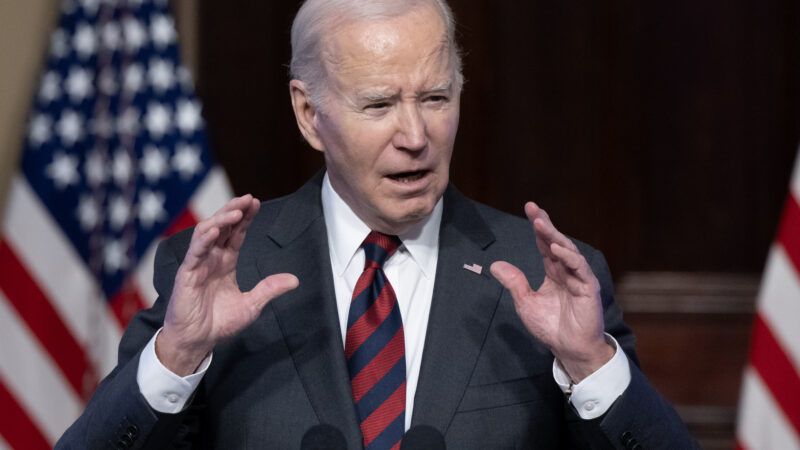Not Again With the 'Shrinkflation,' Please
Shrinkflation is just inflation by another name, and two other facts to keep in mind during tonight's State of the Union address.

President Joe Biden will reportedly use tonight's State of the Union address to once more rail against what the White House has taken to calling "shrinkflation"—the annoying corporate practice of shrinking the size of products rather than raising prices.
Politico reported this week that "recent drafts of Biden's State of the Union address have included a reference to shrinkflation as part of a broader segment on administration efforts to pressure companies to lower costs across the board." A White House spokesperson told the outlet that Biden "will continue to call out rip-offs such as shrinkflation, greedflation, and price gouging."
You'll note that, up there in the first sentence, I acknowledged that shrinkflation is annoying. It is, and polls show that consumers are indeed put off by the practice. Even Cookie Monster is upset about it. There are reasons to believe this is, on some level, a politically savvy move by the White House that reflects whatever data it's gleaned from polling.
But Biden's economically illiterate attempts to pin shrinkflation on greedy corporations aren't telling even half of the story. Here are three things to keep in mind when Biden starts spouting off tonight.
First, shrinkflation is just inflation.
It's not a side effect of inflation or a consequence of inflation. It is inflation. So when Biden, or anyone else, is complaining about this, what they are really saying is, "Wow, it sure sucks that your money doesn't buy as much stuff as it used to." Maybe that can score Biden some points for looking like he shares the concerns of regular Americans—even though he hasn't had to worry about a household grocery budget in decades—but this is nothing more than an attempt at rhetorical misdirection.
Second, shrinkflation is not a new phenomenon (because it is no different from inflation, which has also been around for as long as people have been using money).
Corporations didn't suddenly get more greedy and they didn't discover the tradeoff between sizes and prices in the wake of surging inflation during 2022. In fact, shrinkflation has been around since before there were corporations.
"Whenever grain was in short supply in feudal Europe, bakers had two choices: They could either raise prices or sell smaller loaves. They chose the latter," wrote Keith Plocek in Slate in 2022. "To do otherwise would violate the widely-held principle of a "just price"—formulated by Thomas Aquinas in the 13th century—and invite a bread riot."
That famous business school story about American Airlines saving a ton of money by removing a single olive from the salads it served to passengers in the 1980s? That's shrinkflation! What about Chock full o'Nuts deciding to sell 13-ounce packages of coffee instead of one-pound containers, thus ushering in an industrywide change? Shrinkflation! This is neither a novel idea nor a particularly sinister one, and it is certainly not something that needs to be regulated by the federal government.
Finally, Biden's proposed solution to shrinkflation would automatically cause prices to rise.
We don't yet know exactly what Biden is going to suggest at tonight's speech, but it seems likely that he'll tout a new task force launched this week meant to combat "unfair and illegal" pricing. On Tuesday, Biden announced the joint project of the Federal Trade Commission and Department of Justice with the goal of "making sure corporations are held accountable when they try to rip off Americans."
It's worth asking: What would happen if this task force succeeds? Assume every company in America decides to immediately undo any reductions in the size or quantity of products. What would happen to prices?
"In an inflationary environment, firms must decide whether to raise their headline prices or trim product sizes," wrote Ryan Bourne, an economist at the libertarian Cato Institute. "Banning 'shrinkflation' is effectively a mandate to raise package prices, rather than pursuing a size‐price bundle that some (particularly low‐income) consumers might prefer."
To put it in terms even Cookie Monster might understand: If the cost of making a single cookie has increased—because the flour and sugar are more expensive, and the workers making the cookies are making higher wages—then the cost of a package of 20 cookies will increase accordingly. If you want to avoid raising prices, you might only sell 15 cookies per package.
But if the government mandates 20 cookies per package—such an incredibly silly thing to have the federal government regulate, it's worth noting—then the price of that bag of cookies is certainly going up. The inflation that's occurred over the past few years can't be wiped away with a White House edict or canceled by a new task force.
As Dean Baker, a senior economist at the progressive Center for Economic and Policy Research, told Politico this week: "Costs have gone up—wages are 20 percent higher than they were in 2019….We're not going to have a world where people get to keep their 20 percent pay increases and pay what they did four years ago for food."
Bizarrely, Biden's attempt to change the conversation away from inflation involves a set of policies that would make Americans even more aware of how inflation is affecting them. The White House should be careful what it wishes for.


Show Comments (107)